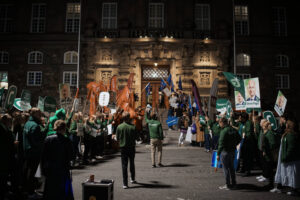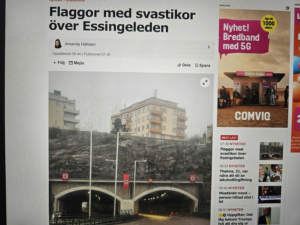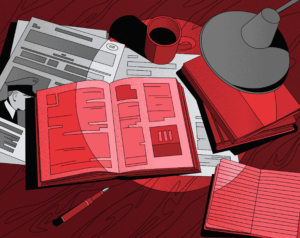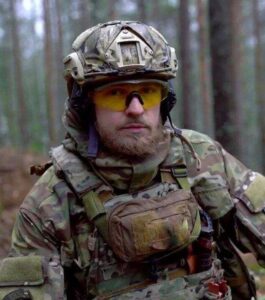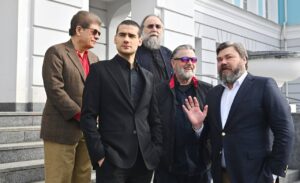By Jan Rettig, https://antifascist-europe.org/european-parliament/
This is an overview of the initial reactions of some European far-right voices on the Ukraine war as expressed in a sitting of the European Parliament (EP) on 1 March 2022, which opened with a speech by Ukrainian President Volodymyr Zelenskyy.[1] The parliamentary agenda and later outcome was a resolution, which had been drafted by the European Council, the Council of Ministers and the Commission. One fun fact in advance: One point of the resolution is dedicated to the well-known interconnections between the Russian regime and the European far right, but none of the parties in question even referred to it. Moreover, most the Members of the European Parliament (MEPs) that I would include in the far right voted in favour of the resolution.
It’s rather rare to see far-right MEPs vote along the same lines as their conservative, liberal, green, social democratic and left counterparts. The condemnation of the Russian aggression against Ukraine was almost universal. Marco Zanni, who doubles as the frontman of the Italian Lega (League) delegation and of the EP parliamentary group Identity & Democracy (ID), took a clear position against the Russian aggression. It’s important to recall that the Lega in 2017 signed a pact with the Russian government party United Russia and the Putin sympathies of party leader Matteo Salvini are no secret. So Zanni underlined the typical nationalist mantras like the violation of territorial integrity and sovereignty and European unity, a line of argument he delivered twice during his short speech.
The German Alternative für Deutschland (Alternative for Germany, AfD) remained silent in the EP debate. The party’s board had published a statement some days earlier which generally sided with public opinion. But the party cannot hide the fact that its overall positions in the past have increasingly leaned towards Russia. Consequently, the statement concluded by lumping in Nato, the USA and Europe in regard to the present situation and the future responsibilities in solving the crisis.
Jordan Bardella, representative of the French Rassemblement National (National Rally, RN), engaged in a similar relativisation. After briefly labelling the Russian aggression as unacceptable, he sought to blame US hegemony and the lost balance of power with Russia. His logic may be twofold: First, so as not to disgruntle a partner to whom one has concrete economic, that is credit, ties; and second, so as to advance one’s own, slightly modernised view of international relations which he summed up as multipolar. For sovereigntist RN, the strongest poles at this level are, of course, nation-states, though even some RN positions do acknowledge core elements of the EU as a given reality. That RN has taken a position against Russia at all may only be motivated by the necessities of identifying with decent and acceptable positions in the current presidential election campaign. Even the Muslim-hating, fake-history spreading and straight populist-speaking Éric Zemmour condemned the Russian aggression. Four recently defected RN MEPs are now supporting his candidacy and his party Reconquête (Reconquest). In the EP plenary debate, though, they didn’t receive any speaking time due to their loss of group status.
Other far-right MEPs took a more serious stance on Russia and even more in favour of a European and western-linked Ukraine. One was the Italian Raffaele Fitto, formerly a member of Forza Italia (once Popolo della Libertà) and now member and elected representative of the post-post-fascist Fratelli d’Italia (Brothers of Italy) and part of the European Conservatives and Reformists (ECR) parliamentary group. Condemning Russian barbarism and declaring full solidarity with Ukraine, he underlined, first, the role which eastern EU member states now have to play in confronting the humanitarian crisis and, second, the importance of the unity and the strength which the EU on the whole has already shown and will have to continue to demonstrate. Interestingly enough, he linked the measures and sanctions taken against Russia with future social consequences and therefore clearly sees the necessity of a consensus with public opinion, a strategic thought and view only a few far-right politicians are capable of expressing.
Another staunch pro-western representative is Peter Kofod, MEP of the Danish Dansk Folkeparti (Danish People’s Party, DF) and part of the ID group. He was forthright in his condemnation of the Kremlin’s terror and the tyranny of Vladimir Putin. Ukrainians, on the other hand, are part of a European family and refugees have to be welcomed in our homes, he added. As long as they are not from outside Europe, as the DF is known for its strong anti-immigration positions.
The anti-communist, neo-Francoist Spanish Vox has remained loyal to its roots and has positioned itself as anti-Russian too. One of its MEPs, Jorge Buxadé, expressed his gratitude to Poland for its efforts and warned the Spanish prime minister not to use the war to cover up his domestic failures, referring to rising inflation and social needs. This intervention came shortly after Vox, in alliance with the Partido Popular and some liberals, successfully forced the Spanish government into delivering arms to Ukraine.
While Hungarian Fidesz MEP Kinga Gál, who remains without a EP political group after her party left the European People’s Party, put forward rather reserved positions (though Fidesz and she too explicitly condemned Russian aggression, Anna Fotyga, MEP with the Polish government party Prawo i Sprawiedliwość (Law and Justice), openly celebrated the Ukrainian heroism as “the best part of us, the West”. Though Poland and Hungary are both very similar in terms of the state becoming more authoritarian, in the past the Hungarian Premier Victor Órban has opted for greater ties with Russia, while the Polish raison d’être is definitely the integration into Nato and the West.
Of course, there are far-right positions in favour of Russia, too. Within the EP it fell on the Slovaks to be most explicit in formulating it. Milan Uhrík and Miroslav Radačovský were elected MEPs for the neo-fascist party Kotleba–Ľudová strana Naše Slovensko in 2019 but have both left it in the meantime. What they haven’t abandon is their pro-Russian stance and so they just engaged in whataboutery, denouncing the war motives of others in the past and the hypocrisy of all those who are now accusing Russia. Radačovský specifically argued against the war in Ukraine because it involves two Slavic peoples fighting each other. While Uhrík was consistent and voted against the EP resolution, the Greek MEP Emmanouil Fragkos of the folkish, Orthodox-fundamentalist and traditionally pro-Russian Elliniki Lysi (Greek Solution), and as such part of the ECR group, abstained on the resolution.
To sum up, while these MEPs may not have expressed the gamut of far-right positions on the Ukraine war, most of them clearly expressed themselves more or less against the Russian aggression and in favour of Ukraine. Their most frequent argument, not surprisingly, concerns the violation of national integrity and sovereignty, which puts them in line with most conservative and many other critics as well. Another ideological approach refers to European commonality and unity, which is often stressed in the closer and wider past of far-right topoi, but which now includes the Ukrainian people on top. Only a few voices, if at all, addressed the social-material questions that have already arisen. Though now a minoritarian view, there are still defenders of the Russian position, which should not be ignored, especially given the voicing of anti-Russian positions that are insincere and tactical in nature.
[1] The draft minutes are here: https://www.europarl.europa.eu/doceo/document/CRE-9-2022-03-01_EN.html. The positions taken by far-right MEPs as they are formulated in the article are taken either from the EP’s translation (see the video links) or are my own rough translation.
